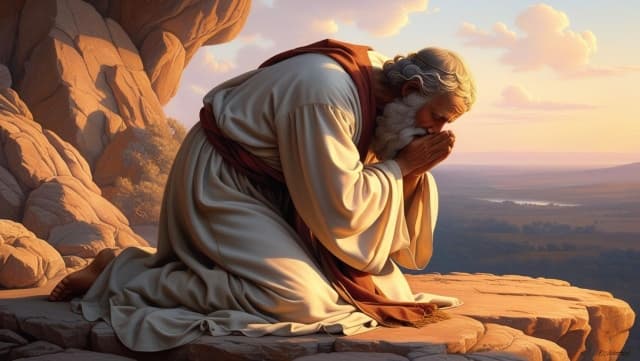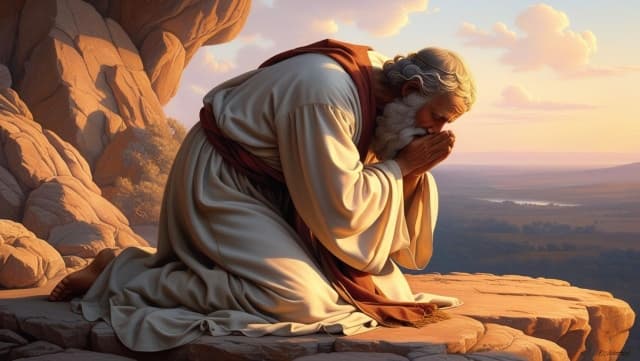Justice and Righteousness in Amos

Amos was the earliest prophet whose words are preserved in the form of a book. He prophesied in the Northern Kingdom of Israel somewhere between the years 760-750 B.C. Amos’ preaching took place during the mid-eighth century B. C., a few years before the prophet Hosea began his ministry.
The eighth century was a period during which a privileged few in Israel were enjoying unprecedented prosperity while most Israelites were facing dire poverty. Although Amos lived in Tekoa, a small village bordering the wilderness of Judah, his preaching to Israel provided a powerful prophetic witness for all ages because of his condemnation of the spiritual blindness of the Judean upperclass and their unjust exploitation of the poor.
Amos forged an explicit and unbreakable link between justice toward the neighbor and righteousness before God, a link that went back to the covenant at Sinai and to the ancient prophetic traditions of Israel. Amos’ ministry provides an eternal witness of God’s opposition to economic, political, and social injustice.
The words of Amos were adapted by Martin Luther King, Jr., whose famous “I Have a Dream” speech in Washington, D.C. in August 1963 brought a new meaning to the words of Amos: “Let justice roll down like waters, and righteousness like a mighty stream” (Amos 5:24).
Amos spoke to an oppressed society and his concern for the poor and the oppressed made him a prophet for all times. Amos is also a prophet for the twenty-first century, a time when the gap between rich and poor has never been greater.
The sources of oppression and injustice may look different today, but people’s concern for material prosperity reflects the days in which Amos lived. Amos’ message of God’s opposition to injustice, his criticism of the people’s worship of material things, and his witness of God’s special concern for the poor and oppressed, affirm that the worship of God in any age is worthless if social oppression and injustice are ignored.
Since justice and righteousness are the focus of Amos’ message, it is important to look at how the words justice and righteousness are used by the prophet. The words justice and righteousness are used together three times in two chapters of the book of Amos (Amos 5:7; 5:24; 6:12). The word justice is used once by itself (Amos 5:15).
“O you who turn justice to wormwood, and cast down righteousness to the earth” (Amos 5:7 RSV).
“Hate evil, and love good, and establish justice in the gate; it may be that the LORD, the God of hosts, will be gracious to the remnant of Joseph” (Amos 5:15 RSV).
“But let justice roll down like waters, and righteousness like an ever-flowing stream” (Amos 5:24 RSV).
“Do horses run upon rocks? Does one plow the sea with oxen? But you have turned justice into poison and the fruit of righteousness into wormwood” (Amos 6:12 RSV).
Wormwood was an extremely bitter plant. The word was used several times in Jeremiah and in Lamentations to describe the bitterness of the calamities that befell Judah at the time of their exile to Babylon (Jeremiah 9: 15; 23:15; Lamentation 3: 15, 19). The justice that Israel’s courts dispensed to the poor was nothing but bitterness.
The oppression and injustice Amos found in the Northern Kingdom was evidence that righteousness had been thrown to the ground as something worthless by those who were in power. Righteousness no longer had any meaning for the powerful people of Israel as a requirement of the worship of God.
To Amos, “hating evil and loving good” was a simple yet powerful statement of how to establish justice “in the gate.” In a very simple language, the prophet placed principles of true justice before a group of people who could argue about legal technicalities while tolerating bribery, corruption, and greed.
The gate of the city was fortified in order to protect the city from enemies and to serve as the place where the elders of the city would gather as a legal assembly to decide cases needing adjudication. The gate was the place where the local judiciary met to determine right and wrong in legal disputes, and therefore, to decide who was innocent or guilty.
Deuteronomy 25: 1 describes this process: “Suppose two persons have a dispute and enter into litigation, and the judges decide between them, declaring one to be in the right and the other to be in the wrong.” If the judges successfully declared where the right was, then justice had been
served.
The decision of the court had a redemptive aspect for the parties involved in the litigation. The decision of the court was intended to vindicate the just party in a legal dispute. The decision was also intended to protect the social order by determining right and wrong and correcting the wrong. Thus, the decision of the court was particularly important in cases where the poor, the widow, the orphan, and the alien, people without power and influence, could not find redress in the community apart from the decision of the court.
When the words “justice” and “righteousness” are used in Amos, justice is the primary word since it appears first in the parallelism of the two words. Justice is the result of seeking or loving good, as in Amos 5:15. Justice is also the fruit or the result of righteousness as in Amos 6:12. Thus, according to Amos, righteousness is essential to the well-being of the community. Righteousness is essentially a relational rather than an absolute ethical idea. Righteousness has to do with the relationship between a person and God, and a relationship between members of the community. Righteousness is a relational concept; its meaning is determined by the particular social context in which it is used. Righteousness is a quality of life which is displayed by people who live up to the demands of the covenant. The righteous person does what is right to other persons involved in the relationship.
Amos proclaimed that Israel had violated the ancient traditions of Israel. The poor and oppressed were individuals who deserved the protection of the court and fair treatment by those in a position of dispensing legal decisions. The only way for this to become a reality in Israelite society was for justice to roll down like waters, and for righteousness to run like an ever-flowing stream (Amos 5:24).
NOTE: For other studies on the Book of Amos, read my post Studies on Amos.
Claude Mariottini
Emeritus Professor of Old Testament
Northern Baptist Seminary
NOTE: Did you like this post? Do you think other people would like to read this post? Be sure to share this post on Facebook and share a link on Twitter or Tumblr so that others may enjoy reading it too!
I would love to hear from you! Let me know what you thought of this post by leaving a comment below. Be sure to like my page on Facebook, follow me on Twitter, follow me on Tumblr, Facebook, and subscribe to my blog to receive each post by email.
If you are looking for other series of studies on the Old Testament, visit the Archive section and you will find many studies that deal with a variety of topics.












